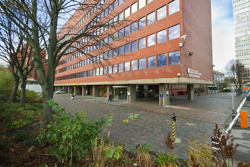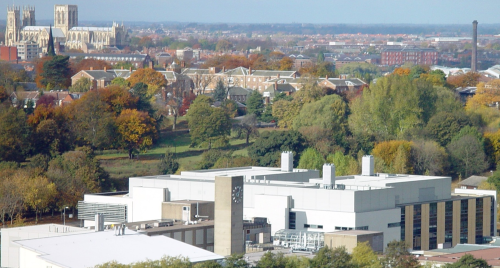University of Leeds

Our position amongst the UK elite for bioscience research was confirmed in the last government Research Assessment Exercise (RAE) 2008 when we were ranked 4th for biological sciences in the UK by the leading scientific journal Nature based on the number of staff producing research that was “world leading” or “internationally excellent”.
Faculty Statistics
- £53m research portfolio
- 110 academic staff
- 150 postdoctoral researcher
The Faculty of Biological Sciences is one of the leading life sciences faculties in the UK, attracting outstanding PhD and Masters students from around the world.
Research excellence underpins our training and interdisciplinarity is very important; students benefit from interactions not only within the UK, but with academic communities around the globe. Ours is an extremely vibrant and dynamic environment, with supervision and teaching by top researchers, many world-class experts, who bring the latest cutting-edge research to students learning.
Key areas include: Sustainable Agriculture, Animal Sciences, Biochemistry and Molecular Biology, Bioinformatics, Biomedical Sciences, Ecology and Evolution, Genetics, Microbiology, Neurosciences, Pharmacology and Physiology, Plant Sciences, Sport and Exercise Sciences, Structural Molecular Biology.
University of Sheffield

One of the most successful bioscience research departments in the country. With research partners in the UK and around the world, Sheffield are developing new approaches to some of the most important questions affecting us today.
In the 2001 Research Assessment Exercise we were awarded the top grade of 5*. Similarly both our sister Departments of Animal and Plant Science and of Biomedical Sciences were also awarded the 5* rating illustrating the strength of the Life Sciences research base at the University. In the 2008 RAE we were ranked in 3rd place in the UK (Source: Times Higher Education). We have a large research school, with over 110 research students (divided almost equally between UK and overseas) and 30 post doctoral researchers, and we publish about 100 research papers per annum. Staff and postdocs in the department come from 13 different countries, and PhD students from 14 different countries, making a lively international environment.
Over the last 5 years the Department of Molecular Biology and Biotechnology has been one of the three highest funded Departments in the UK from BBSRC, one of the major government Research Councils that fund biological research. A hallmark of the Department is its collaborative ethos and more than half of our grants and half of the research papers result from collaboration with scientists from other countries.
University of York

Biosciences at York has been ranked 3rd in the UK for teaching excellence in the Guardian University Guide 2013. Only Cambridge and Oxford scored higher than York, which has now been one of the top five departments in the Guardian tables for four consecutive years
All our postgraduate training is research-oriented, and we have excellent facilities with easy access to the latest equipment and expert advice in our Technology Facility.
All students benefit from a balanced programme of training in broader research-related skills that enhance their career prospects.
The Food and Environment Research Agency (Fera)
 Fera’s vision is to be the long term partner of choice to governments, industries and academia, in applied research, incident response and impartial advice, based on trusted science, to secure the food chain and protect the environment from global threats.
Fera’s vision is to be the long term partner of choice to governments, industries and academia, in applied research, incident response and impartial advice, based on trusted science, to secure the food chain and protect the environment from global threats.
Their role is about understanding problems and enabling sustainable solutions through innovative thinking and the gathering and analysis of robust scientific evidence. This gives them the right platform to be able to support their customers in both the strategic and day-to-day decisions they face.
Fera at a glance
- over 7,500 government and commercial customers
- run over 600 research projects per year
- provide services to customers in over 100 countries
- analyse over 50,000 plant and food samples a year
- carry out over 200,000 plant and bee health inspection visits a year
- work with more than 1,000 collaboration partners
- employ over 550 scientists and 150 plant and bee inspectors
- operate at over 40 sites throughout the UK including York, Cambridge, Stafford and Gloucestershire
- the National Reference Laboratory for chemicals in food, pesticides, veterinary drugs, dioxins and PCBs in feed
- In a typical year their work leads to the publication of over 150 papers in peer-reviewed journals listed in the Science Citation Index
The Research Complex at Harwell (RCaH)
 The Research Complex at Harwell (RCaH) is a new, multidisciplinary laboratory that provides facilities for researchers to undertake new and cutting edge scientific research in both life and physical sciences and the interface between them.
The Research Complex at Harwell (RCaH) is a new, multidisciplinary laboratory that provides facilities for researchers to undertake new and cutting edge scientific research in both life and physical sciences and the interface between them.
It is located on the Rutherford Appleton Laboratory (RAL) site on the Harwell Science and Innovation Campus, adjacent to Diamond, the new third generation Synchrotron Radiation (SR) source. It is also close to other leading facilities on the campus: the ISIS neutron source, Central Laser Facility, Membrane Protein Laboratory, MRC Mammalian Genetics Unit and Mary Lyon Centre, and a Biological Solid State NMR Facility.
It is open, on a competitive basis, to research teams from UK universities, as well as to Diamond and RAL staff. The MRC is leading the project on behalf of RCUK, in partnership with BBSRC, EPSRC, NERC, STFC and Diamond.
